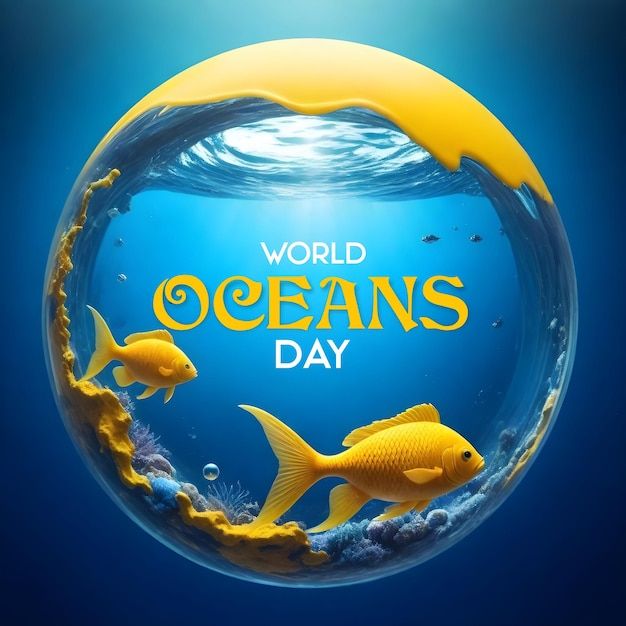World Oceans Day: The Global Call to Protect Our Oceans
Introduction
World Oceans Day, observed annually on June 8, serves as a global reminder of the crucial role our oceans play in sustaining life on Earth. From providing food and oxygen to regulating climate, oceans are vital to our survival. This day brings together millions of people from around the world to celebrate the beauty of our oceans and raise awareness about the need to protect them.
The observance was first proposed by Canada in 1992 at the Earth Summit in Rio de Janeiro and was officially recognized by the United Nations in 2008. Since then, World Oceans Day has become a global event that unites governments, organizations, and individuals in a shared commitment to preserving our oceans for future generations.
History of World Oceans Day
The idea of World Oceans Day was conceived during the 1992 Earth Summit, where the need for environmental awareness was discussed. Canada formally proposed the day, and it gained significant support. However, it wasn’t until 2008 that the United Nations General Assembly officially declared June 8 as World Oceans Day.
The primary goal of this observance is to inspire people to take action to protect the oceans, promote sustainable practices, and highlight the importance of oceans to human well-being and the health of the planet.
Facts About Our Oceans
- Covering 71% of the Earth’s Surface: Oceans make up a staggering 71% of the Earth’s surface, making them the largest ecosystem on the planet. They are essential to the Earth’s climate, absorbing heat from the sun and distributing it around the globe, which helps maintain the balance of temperature.
- Home to Over 230,000 Species: The oceans are home to a vast diversity of life. Scientists estimate that over 230,000 marine species have been discovered, with many more still unknown. From microscopic plankton to the majestic blue whale, the oceans support an incredible variety of life.
- Oceans as Carbon Sinks: Oceans play a significant role in regulating the Earth’s climate by absorbing carbon dioxide (CO2) from the atmosphere. This process helps reduce the impact of global warming, making oceans a crucial ally in the fight against climate change.
- The Oceans Provide Oxygen: The oceans produce more than 50% of the world’s oxygen. Phytoplankton, tiny plant-like organisms in the ocean, perform photosynthesis, producing oxygen and absorbing CO2. Without healthy oceans, life on Earth would not be possible.
- Rising Ocean Temperatures: Climate change has led to the warming of ocean waters. This rise in temperature has devastating consequences, including coral bleaching, loss of biodiversity, and rising sea levels. Protecting the oceans from further temperature rise is essential to prevent these negative effects.
The Significance of World Oceans Day
World Oceans Day is more than just a celebration. It is a day of action and reflection on the state of the oceans and their future. Here are some key reasons why this day is significant:
- Raising Awareness About Ocean Pollution: One of the most pressing issues facing the oceans today is pollution, particularly plastic waste. More than 8 million tons of plastic enter the oceans every year, threatening marine life and ecosystems. World Oceans Day encourages people to reduce plastic use, recycle, and clean up beaches and oceans.
- Promoting Conservation and Sustainability: World Oceans Day emphasizes the need for sustainable practices, such as sustainable fishing, to prevent the depletion of ocean resources. It advocates for the protection of marine environments, including coral reefs, which are home to a large proportion of marine life.
- Protecting Marine Biodiversity: The oceans are home to an incredible range of species, many of which are endangered due to overfishing, habitat destruction, and pollution. World Oceans Day highlights the importance of protecting marine biodiversity to ensure the long-term health of the oceans.
- Combatting Climate Change: Oceans act as a buffer against climate change, absorbing CO2 and regulating temperature. However, rising ocean temperatures and acidification are threatening their ability to function effectively. World Oceans Day calls for urgent action to mitigate climate change and protect the oceans.
- Fostering Global Collaboration: The oceans are a shared resource, and protecting them requires collective action from all countries. World Oceans Day encourages international collaboration to address ocean-related issues and ensure that all nations work together to protect this vital resource.
Observing World Oceans Day
- Community and Educational Events: World Oceans Day is celebrated through a wide range of activities, including community beach clean-ups, environmental education programs, art contests, and ocean-themed events. These events aim to raise awareness about ocean conservation and involve people in practical efforts to protect the oceans.
- Government and Organizational Initiatives: Governments, environmental organizations, and businesses take part in World Oceans Day by announcing policies or initiatives to protect marine environments. This may include bans on single-use plastics, marine protected areas, or policies to reduce carbon emissions.
- Social Media Campaigns: With the growing power of social media, many individuals and organizations use this day to spread awareness about ocean conservation. Social media platforms host campaigns to encourage people to take small actions that can help reduce ocean pollution, such as reducing plastic waste or supporting sustainable seafood.
- Educational Outreach: Schools and universities participate by organizing talks, workshops, and exhibitions about the importance of oceans and the need to protect them. This helps educate the next generation about environmental stewardship and the impact of their actions on the planet.
The Importance of Protecting Our Oceans
Our oceans are not just a vast body of water – they are the lifeblood of the planet. The well-being of the oceans directly impacts the health of the entire ecosystem, including humans. Here’s why we must protect them:
- Climate Regulation: The oceans play a crucial role in regulating the Earth’s climate. By absorbing heat from the sun and redistributing it, the oceans maintain a balance that supports all life on Earth. If the oceans are harmed, global temperatures could rise, leading to severe consequences such as rising sea levels and extreme weather events.
- Sustaining Livelihoods: Millions of people around the world depend on the oceans for their livelihoods. From fishing communities to those in the tourism and shipping industries, healthy oceans are essential for the economy and the survival of these industries.
- Ensuring Food Security: Oceans are a significant source of food, providing essential protein for billions of people. Overfishing and environmental degradation threaten fish populations, which could lead to food shortages for vulnerable communities.
- Aesthetic and Recreational Value: Beyond their ecological and economic importance, the oceans provide beauty, tranquility, and recreational opportunities. Beaches, coral reefs, and marine parks attract millions of visitors annually, contributing to tourism and mental well-being.
- Preventing Ecosystem Collapse: The health of the oceans is directly tied to the health of marine ecosystems. Coral reefs, for instance, support a wide variety of marine species, but they are under threat from climate change, pollution, and overfishing. Protecting the oceans means preserving these vital ecosystems for future generations.
Conclusion
World Oceans Day is an important occasion to reflect on the state of our oceans and the actions needed to protect them. Whether it’s reducing plastic waste, supporting sustainable fisheries, or advocating for stronger environmental policies, every action counts. As stewards of the planet, it’s our responsibility to ensure that future generations can experience the beauty and benefits of healthy oceans.
The oceans are vital for our survival, and their health reflects the health of the planet. Let’s join hands on June 8 to celebrate and protect the world’s oceans, the lifeblood of our planet.










